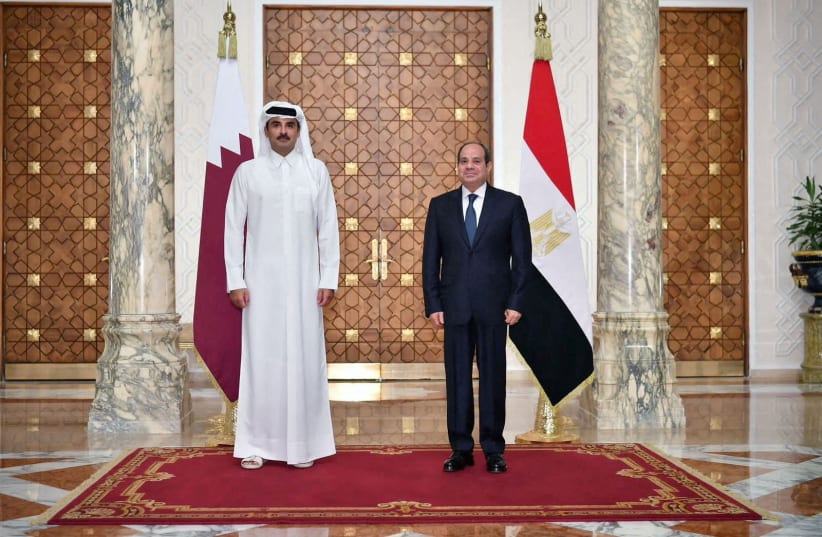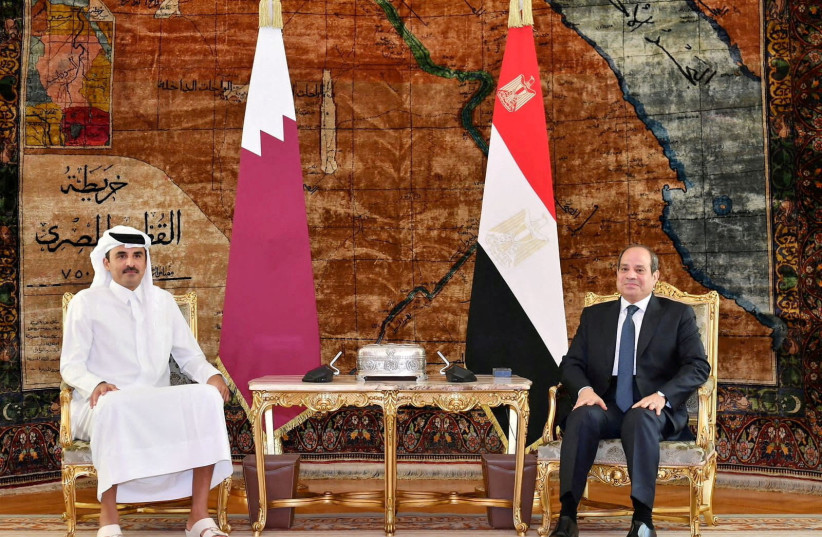Egypt and Qatar have learned that cooperation and competition are not necessarily conflicting approaches and that the key words are flexibility and maneuvering.
By ELIE PODEHAPRIL 10, 2025 01:08

The Qatargate affair remains shrouded in mystery, with many aspects yet to be clarified. Nevertheless, it already prompts significant questions regarding the evolving relationship between Egypt and Qatar, as well as Israel’s potential involvement therein.
Should the allegations against two advisers in the Prime Minister’s Office – namely, that they were engaged to promote Qatar’s international image while marginalizing Egypt’s role – prove accurate, such a campaign would lend credence to the widely held view within Israeli policy circles that Qatar functions as a strategic competitor to Egypt.
As is well known, Qatar supported the Muslim Brotherhood regime of Mohamed Morsi following the Arab Spring, and was behind propaganda broadcasts against both president Husni Mubarak and President Abdel el-Sisi. Egypt was also part of the Arab coalition against Qatar, together with Saudi Arabia, the United Arab Emirates, and Bahrain, which broke off diplomatic relations with Qatar and implemented an economic boycott against it between 2017 and 2021.
Improved relations between Egypt and Qatar
However – and this is a crucial caveat often overlooked by Israel’s media – there has been significant diplomatic and economic rapprochement between Egypt and Qatar since the formal restoration of relations in January 2021.
Several key developments illustrate this trend: in May 2021, Sisi met with the Qatari foreign minister in Cairo; in March 2022, the foreign minister returned for another official visit, during which Qatar pledged to invest $5 billion in the Egyptian economy.
Egypt’s President Abdel Fattah El-Sisi meets with Qatar’s Emir Sheikh Tamim bin Hamad Al Thani at the Ittihadiya presidential palace in Cairo, Egypt, November 10, 2023 (credit: THE EGYPTIAN PRESIDENCY/HANDOUT VIA REUTERS)
Three months later, the Emir of Qatar, Sheikh Tamim bin Hamad Al Thani, paid a landmark visit to Egypt, his first since 2015. This warming of ties was further underscored by President Sisi’s attendance at the opening ceremony of the FIFA World Cup in Qatar in November 2022.
In parallel, the finance ministers of Egypt and Qatar signed a memorandum of understanding aimed at expanding economic cooperation. The Egypt-Qatar Business Council was reestablished with the explicit objective of increasing bilateral trade, which subsequently witnessed substantial growth in the following years.
Within this framework, a Qatari energy company acquired a 40% stake in the American corporation ExxonMobil, which had been granted a concession to explore for natural gas in Egypt’s territorial waters in the Mediterranean.
Qatar also capitalized on Egypt’s economic vulnerability in the aftermath of the war in Ukraine to bolster its influence within the country and cultivate a degree of Egyptian dependence on Qatari financial support.
The rapprochement between Egypt and Qatar also resulted in some coordination during the IDF’s military operations in May 2021 and August 2022, in contrast to the rivalry that characterized their positions during Operation Protective Edge in the summer of 2014.
This was the backdrop against which the war following Hamas’s October 7, 2023 mega-attack, which placed the two states in competition for influence in the Gaza Strip in general, and regarding mediation over the Israeli hostages in particular, with the main “client” being neither Israel nor the hostages, but the United States.
Egypt and Qatar’s differing interests in Gaza
Egypt and Qatar pursue distinct, and at times competing, interests in Gaza, some of which are complementary, while others are in direct contradiction.
Egypt’s geographic proximity to Gaza, its control of the Rafah crossing, and its deep concern over the potential for a mass exodus of Palestinians into the Sinai Peninsula make it the Arab actor most directly affected by developments in Gaza.
Consequently, Egypt has a strong interest in ending the war, preventing large-scale Palestinian displacement, and facilitating the return of the Palestinian Authority to power in Gaza.
Egyptian mediation efforts throughout the war have been guided by these strategic objectives while also serving a domestic purpose: namely, responding to public sentiment that expects Egypt to play a central role in resolving the Palestinian issue.
More broadly, Egypt seeks to leverage its role in Gaza to enhance its regional influence and demonstrate its strategic value as a key partner of the United States in the Middle East.
For its part, Qatar, which is geographically remote from Gaza and is under no threat from it whatsoever, wants to maintain the influence it has gained there since the end of Operation Protective Edge in 2014. This will happen only if Hamas remains in power and if Qatar plays a major role in the reconstruction of Gaza.
Egypt and Qatar have thus learned that cooperation and competition are not necessarily conflicting approaches, and that the key words are flexibility and maneuvering.
L to R: Egyptian President Abdel Fattah al-Sisi,Emir of Qatar Sheikh Tamim bin Hamad Al Thani against backdrop of Qatar (illustration). (credit: Canva, REUTERS)
Israel’s role in the complex Egypt-Qatar relations
Israel has inserted itself into this complex set of relations, with both Egypt and Qatar playing central roles in efforts to release the hostages and end the war. While Israel’s relations with Egypt are well known, its relationship with Qatar is hidden by a thick veil of secrecy.
Qatar’s support for the Muslim Brotherhood, as well as Al Jazeera’s propaganda broadcasts, have not prevented the development of below-the-radar relations between the two states, which began during the 1990s and continued even after Qatar banished Israel’s ambassador in 2000, following the outbreak of the Second Intifada.
The fact that Israel has continued with both open and covert relations with Qatar throughout the war should not, then, be a surprise. Nor is there anything surprising in the manipulative way in which Qatar pursues its foreign policy. In fact, flexibility and maneuvering have characterized Israeli-Qatari relations for a long time, even if, in retrospect, this policy contributed to the disaster of October 7.
What is surprising and worrying, however, is the fact that Israel chose (if the allegations turn out to be true) to help strengthen Qatar’s image regarding the mediation efforts while minimizing Egypt’s contribution. Furthermore, what appears to be a well-orchestrated media campaign has suddenly emerged (the timing of which may have been coincidental or may have been connected to the Qatari affair) against Egyptian reinforcement directed against Israel.
Relations with Qatar, open and/or covert, serve Israel’s goals. However, if such relations come at the expense of Egypt in any way, then it is a mistake. For Israel, the size, proximity, and importance of Egypt makes it its most valuable Arab ally.
Though diplomatic and military channels have been kept open during the war, contacts were not held at the helm. Moreover, several government ministers made extreme political statements that negatively reverberated in the Egyptian media.
March 26 marked the 46th anniversary of the peace agreement between Israel and Egypt. Yet it appears that the Israeli government tends to take this peace for granted, rather than treating it as a delicate flower in need of constant care and cultivation. Maintaining and strengthening the peace with Egypt should remain a top priority in Israel’s Middle East foreign policy agenda.
The writer teaches in the Department of Islamic and Middle Eastern Studies at the Hebrew University of Jerusalem, is a board member of Mitvim – The Israeli Institute for Regional Foreign Policies, and is a member of the Coalition for Regional Security.
Content retrieved from: https://www.jpost.com/opinion/article-849464.


